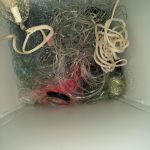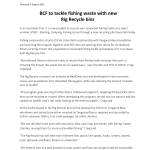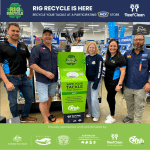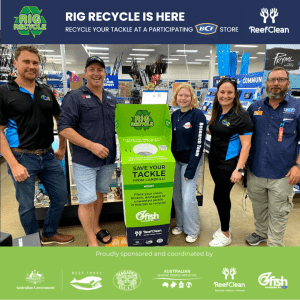Rig Recycle QLD SRP
Source Reduction Plan (SRP) Overview
Name of SRP
Partners Delivering the SRP
Tangaroa Blue Foundation – created, delivered, and led the SRP
Australian Government Reef Trust – funding TBF ReefClean
Australia National Sportfishing Association
OzFIsh
BCF – implemented Rig Recycle stations for people to dispose of fishing gear
TackleWorld – implemented Rig Recycle stations for people to dispose of fishing gear
Tackleland Sandgate – implemented Rig Recycle stations for people to dispose of fishing gear
Boyne Bait and Tackle – implemented Rig Recycle stations for people to dispose of fishing gear
Barra Jacks Kawana – implemented Rig Recycle stations for people to dispose of fishing gear
Coral Sea Marina Resort – implemented Rig Recycle stations for people to dispose of fishing gear
The Fishing Warehouse – implemented Rig Recycle stations for people to dispose of fishing gear
Location
BCF stores in QLD (2021 – 2022 Trial): Cairns, Noosa, Townsville, Innisfail, Airlie Beach, Yeppoon, Mackay, Smithfield, Deeragun, Ayr, Gladstone, Bundaberg, Rockhampton
TackleWorld stores in QLD (2022 – 2024): Yeppoon, Gladstone, Bundaberg, Mackay, Airlie Beach, Bowen, Townsville, Tully, Cairns, Weipa, Cooktown
Independent business’ in NSW (2022 – 2024): Tackleland Sandgate, Boyne Bait and Tackle, Barra Jacks Kawana, The Fishing Warehouse, Coral Sea Marina Resort
Photo 1
Evidence of the issue

Photo 2
Evidence of SRP resources

Photo 3
Evidence of positive outcomes

Overall Goals & Background
Targeted Debris
Recreational Fishing equipment
- Mono filament line will be recycled
- Plastic line spools will be recycled
- Handline spools can be either recycled or upcycled
- Hooks – not rusty, will be upcycled where possible
- Sinkers – any condition, will be upcycled where possible
- Swivels – not rusty, will be upcycled where possible
- Lures – in any condition – if they cannot be repaired, they will be used for parts
- Floats – in good condition, will be upcycled where possible
- Associated hard plastic packaging will be recycled
Why is the SRP needed?
In 2020, we identified there was no recycling program available for recreational fishing items and their single-use packaging.
Data from the Australian Marine Debris Initiative (AMDI) Database shows that fishing line makes it into the top 10 items found during clean-up events, with over half a million metres removed from over 4,000 clean-up events (2021).
Rig Recycle was developed and trialed in QLD as part of Tangaroa Blue Foundation’s ReefClean program, removing and preventing marine debris and litter impacting the Great Barrier Reef. Feedback from recreational fishers and retailers also identified the need for a recycling collection and recycling system that could accept not just broken and unwanted fishing gear, but also single-use plastic packaging items like fishing line spools.
In the short term, we aim to divert specified recreational fishing items and packaging accessories from becoming litter in the environment or being disposed of in landfills. In the long term, we aim to deliver a circular economy model that fills a recycling gap.
Logistics
Timeline and Project Goals
- QLD 2021 – 2022 trial (12 months)
- QLD 2022 – present day (2 years and ongoing)
The project trial was successful and Rig Recycle has continued to expand further afield to other locations within Australia.
Trial Phase: To have 24 Rig Recycle stations produced, with 2 stations going to each of the 12 participating BCF stores. Volunteers to sort and count recycled fishing items, with recorded data uploaded into the Australian Marine Debris Initiative database (AMDI). This data provides an insight into how much fishing waste is being saved from landfill by having the Rig Recycle stations available.
The 5 major goals of the Rig Recycle program: Recover, Reuse, Repair, Recycle & Reduce.
The Rig Recycle project was officially launched in February 2022, after the success of the trial. Rig Recycle stations produced and dispatched to another 3 BCF stores in QLD.
Measuring Success
Assets: Rig Recycle stations were created and distributed
Contents of the stations are audited by staff and the data is recorded into AMDI. The overall amount (kg) collected from the stations allows us to measure the reduction of recreational fishing litter that would be going into the environment and landfill, as well as the success of the program.
Our target audience is recreational fishers and fishing retailers. Some examples of how we measured reaching our target audience and community engagement are;
- Tangaroa Blue displayed a Rig Recycle station at the VMR family fishing classic event from 24th – 26th June 2022. This event was hosted by Marine Rescue Bundaberg at Burnett River, Burnett Heads. The main focus was to educate those attending about the Rig Recycle project. 1150 people registered to compete in the event, and the actual number of visitors was estimated to be a lot higher.
- Tangaroa Blue held a display stall at the Boyne Tannum Hook-Up event from 28th April – 30th April 2022. This event was hosted at Bray Park, Boyne Island. The focus of the event was to educate those attending about the Rig Recycle project. Overall, a whopping 32,000 people checked in at the event. Tangaroa Blue were invited back to host another display stall.
Data Collection & Reporting
Tangaroa Blue Staff collect contents of the stations on an as-needed basis. The contents are audited and data is recorded into AMDI.
Results and Reflections
Positive Outcomes
There has been a significant reduction of recreational fishing litter going into the environment and landfill from this initiative.
Achieved reaching our target audience;
- 11 recreational fishing retailers in QLD currently still support Rig Recycle by hosting a station
- Introduced and discussed our Rig Recycle program to recreational fishers at two popular Fishing Competition events
- Working with the partners to help generate awareness was an effective way to convey the campaign messaging to our target audience.
Our Rig Recycle Instagram and Facebook pages
Funding
In 2023, funding was allocated to the Rig Recycle AMDI app project, with the aim to support data collection efforts.
Challenges & Improvements
Original project partnerships changed for Rig Recycle station hosting, which led to a new relationship with TackleWorld.
Project development includes having one station at the host’s location instead of two at each location like when the trial began.
Future Opportunities
SRP is still in action in QLD and has expanded nationally. TackleWorld stores all over Australia have become a strong supporter of Rig Recycle in addition to small independent fishing retailers.
11 tackle stores throughout QLD have Rig Recycle stations as of March 2024, with plans for expansion.
ReefClean funding enabled us to purchase our first processing unit in Queensland and Tangaroa Blue has proudly partnered with BC Plastics in Brisbane. This partnership is instrumental in turning a circular economy vision for Rig Recycle into fruition.






